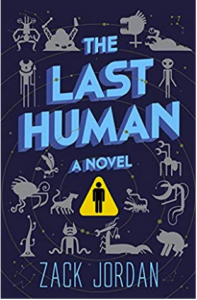 Sarya was raised to believe that she is the last human in all the known universe by her adoptive mother, Shenya the Widow, a member of a matriarchal arachnid-like race of killing machines. On Watchtower, the space station where they make their home, Sarya passes as a low-intelligence member of a species bearing a resemblance to humanity, even as she wistfully researches what became of her people. Humans, she learned early on, were deemed too dangerous to live by the universe-spanning conglomeration that connects all the (other) known space-faring civilizations, and were thus exterminated. Sometimes 17 year-old Sarya feels so ordinary that she finds it hard to believe that humans could possibly be more dangerous than, say, her mother, but as adulthood approaches and she faces the prospect of a lifetime of menial work and being treated like a barely sentient being by almost everyone around her, she starts to wish for something more.
Sarya was raised to believe that she is the last human in all the known universe by her adoptive mother, Shenya the Widow, a member of a matriarchal arachnid-like race of killing machines. On Watchtower, the space station where they make their home, Sarya passes as a low-intelligence member of a species bearing a resemblance to humanity, even as she wistfully researches what became of her people. Humans, she learned early on, were deemed too dangerous to live by the universe-spanning conglomeration that connects all the (other) known space-faring civilizations, and were thus exterminated. Sometimes 17 year-old Sarya feels so ordinary that she finds it hard to believe that humans could possibly be more dangerous than, say, her mother, but as adulthood approaches and she faces the prospect of a lifetime of menial work and being treated like a barely sentient being by almost everyone around her, she starts to wish for something more.
Enter Observer. A planetary intelligence who has eschewed connection to the Network that governs civilization, He offers Sarya the adventure of a lifetime, promising that He can lead her to what’s left of humanity. Sarya accepts but things quickly go awry, and she finds herself a pawn in a game between intelligences she has little hope of fathoming, much less beating. Being human, however, she’s not going down without a fight.
Despite being a rollicking, fast-paced space opera, The Last Human was also a deft if overt allegory for life and progress, whether of individuals or entire societies. Because Sarya, as our heroine, must learn and grow and become a better person, there’s definitely a huge chunk in there which mirrors most people’s adolescent impulse towards libertarian exceptionalist nonsense — a phase which fortunately most people subsequently grow out of. I was actually concerned, while reading the book, that Sarya might not and that I would have to rate this book poorly for being intellectual garbage, but Zack Jordan assuredly pulls the novel back round to an affirmation of good sense. Frankly, it got a little uncomfortable for me till he did, as I’m the kind of person who gets irritated when others are dumb on purpose.
That said, this was a surprisingly layered and highly ambitious look at sentience and evolution that could never have been written in any other genre. Mr Jordan is doing some really intellectually intricate, challenging stuff here that might not be every reader’s speed. I think he does linger a little too long on the bits where Sarya is under Observer’s sway, but that’s also where a lot of the action-y/grotesque bits are, so I can understand why he does so even if my sensibilities would prefer he hadn’t. This isn’t an easy book by any means, but it’s ultimately a rewarding, thought-provoking journey, with lessons that apply to any person’s daily life, examined or otherwise.
